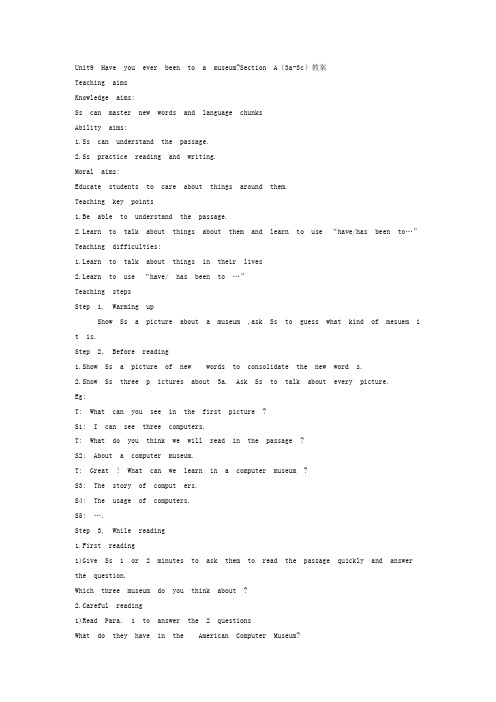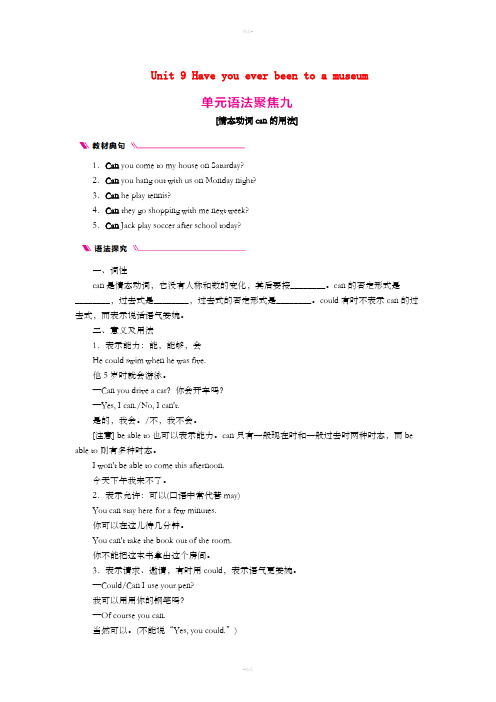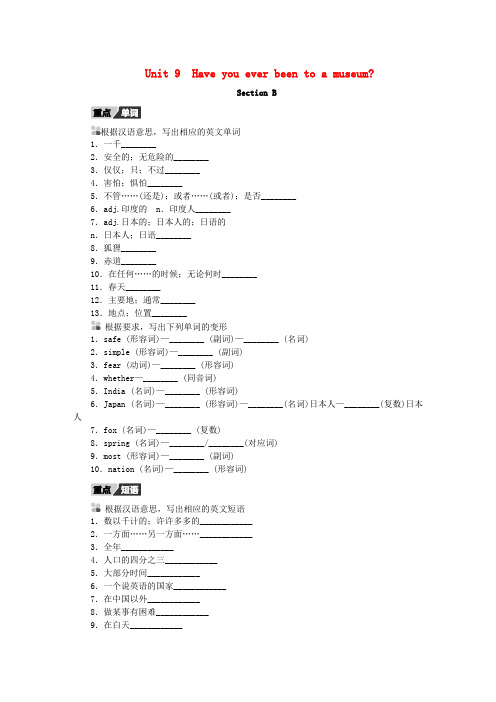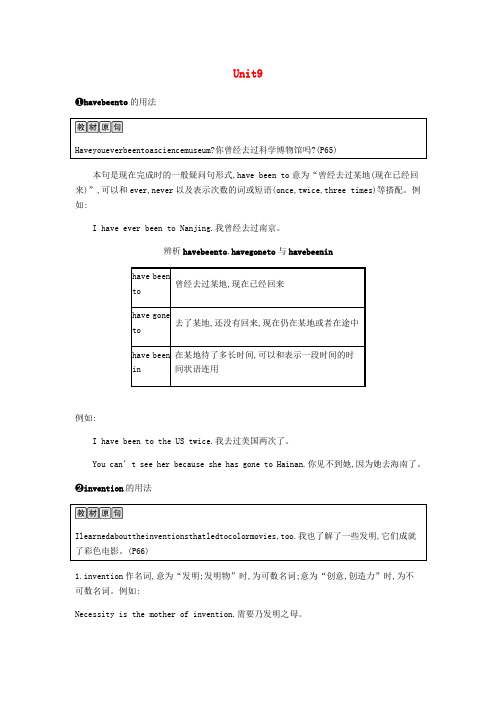2019年春八年级英语下册Unit9HaveyoueverbeentoamuseumSectionA(3a_4c)同步练习
初中英语人教版八年级下册Unit 9 Have you ever been to

Unit 9 Have you ever been to a museum?教学目标1.语言目标:掌握谈论过去经历及好玩地方的相关词汇。
2.技能目标:能听懂谈论过去经历的对话材料;通过听说训练,学会谈论好玩的地方;能写出重点单词和重点句型,并能描述旅游地方。
3.情感目标:通过本课的学习,让学生掌握主题公园和博物馆的英文名称,培养学生热爱祖国大好河山的精神。
教学重点句子:1.—Have you ever been to a science museum?—Yes,I have.I went to the National Science Museum last year.2.—I have never been camping. —Me neither.3.It also encourages governments and social groups to think about ways toimprove toilets in the future.4.—I have been to the art museum many times.—Me too.And I have also visited the nature museum.5.Have you visited the Palace Museum?6.Have you been to the Great Wall?7.You won’t have any problem getting rice,noodles or dumplings.教学难点1.能熟练掌握并使用have / has been to以及already,ever与yet的用法。
2.能够运用所学句型谈论过去的经历。
第一课时Section AStep 1 GreetingNice to meet you! Nice to meet you,tooWhat day is it today? It is Monday.What is the date today? It is Juan 12th.How are you? -------Step 2 Guide1.Revise the present perfectUse some pictures about Beijing Shanghai Guilin Nanning Guangzhou Wuzhou,and then ask the students to answer the teacher’s question,e.g:—Have you ever been to-----------?—Yes,I have.No, I haven’t.2.Look at the picture and learn the new words.Step3 PresentationGuess the places of the pictures; they are the British Museum, space museum, history museum, water park, zoo, amusement park while lead in sentence patterns:“ Have you ever been to …?”Get students to work in pairs to practice the conversatio n: “Have you ever been to…”“Yes, I have.”/ Not, I haven’t.Step4 Pre-listening1a.1.Please read the names of these places. (Teacher writes the names on the blackboard.) Which of these places would you like to visit? Rank them from 1 to 5.S4: Amusement park _____, water park _____, zoo _____ aquarium _____ space museum _____.S5: Space museum _____, aquarium _____, zoo _____, water park ____, amusement park _____S6: …2. Talk about the picture.Step 5 ListeningListen and choose the best answer. The first and the second question aim to listening to time, and the third one aims to listen for the relationship. This activity trains students’ listening ability for listening for specific relationship.1)When did Sarah visit the National Science Museum?A. Today.B. Yesterday.C. Last year.2)When did Claudia visit the nature museum?st year.B. Last summer.C. Last school trip.3)What may the relationship be between the two speakers?A. Friends.B. Teacher and student.C. Mother and kid.Keys: 1-3 CCAListen again. Listen and check the boxes. Have these students ever been to theseAsk and answer in pairs:A: L et’s go somewhere different today.B: OK. Where do you want to go?A: Have you ever been to the space museum?B: No, I haven’t. How a bout you?A: …Step7 Listening2a. Listen and circle the places that you hear.2b. Listen again and circle T for true or F for false.Conversation 11. Tina went to the space museum last year. T/F2. John has never been to the space museum. T/F3. They are going to take the subway. T/FConversation 21. Linda has been to the amusement park. T/F2. Linda went to the amusement park yesterday. T/F3. Linda is going to the amusement park again by bike. T/FConversation 31. Frank had a great time at the water park. T/F2. Frank’s friend has never been to the water park. T/F3. Frank and his friend are going skating. T/FKeys: TFT TFT FTTSpeakingLook at the map in 2a and make conversations about the places.A: Have you ever been to the space museum?B: Yes, I have. How about you?A: No, I haven’t.B: Oh, it’s fantastic. Let’s go tomorrow.A: OK. How are we going to get there?B: We can take the subway.SpeakingRole-play the conversation in 2d.A: I went to the film museum last weekend. Have you ever been there? …B: Yes, I have. I went there back in April. ……Step8 Language points1. I learned about the inventions that led to color movies, too. 我还了解了一些发明,它们成就了彩色电影。
八年级英语下册 Unit 9 Have you ever been to a muse

单元语法聚焦九
( B ) 8.2017·重庆B John and I ________to visit his grandparents
last Sunday afternoon.
A.go
B.went
C.will go
D.have gone
【解析】考查动词的时态。根据句中的时间状语“last Sunday afternoon” 可知,用一般过去时态,故选B。
单元语法聚焦九
( B ) 5.2017·泰州 Neither Jim nor Tom _______ Australia before,
but they know the country very well.
A.has gone to
B.has been to
C.have gone to D.have beento, have gone to 与 have been in
1.have been to 表示“去过某地”,现在已经不在那个地方了。如: My uncle has been to Beijing twice. 我叔叔去过北京两次。 2.have gone to 表示“去某地了”,指现在到了某地或在去某地的 途中。如: The Greens have gone to Dalian for a holiday. 格林一家去大连度假了。
Unit 9 Have you ever been to a museum?
单元语法聚焦九
Unit 9 Have you ever been to a museum?
单元语法聚焦九
语法精 讲 语法精 练
单元语法聚焦九
语法精讲
一、含ever 和 never的句式
ever 和 never虽同为现在完成时的标志词,但用法不尽相同。 ever 意为“曾经”,表示肯定意思,可用于肯定句、否定句和疑问 句。never 意为“从不”,表示否定意思,常用来回答含有ever的一 般疑问句。
初中英语人教版八年级下册unit9 Have you ever been to a

Unit9 Have you ever been to a museum?Section A(3a-3c)教案Teaching aimsKnowledge aims:Ss can master new words and language chunksAbility aims:1.Ss can understand the passage.2.Ss practice reading and writing.Moral aims:Educate students to care about things around them.Teaching key points1.Be able to understand the passage.2.Learn to talk about things about them and learn to use “have/has been to…”Teaching difficulties:1.Learn to talk about things in their lives2.Learn to use “have/ has been to …”Teaching stepsStep 1, Warming upShow Ss a picture about a museum ,ask Ss to guess what kind of mesuem i t is.Step 2, Before reading1.Show Ss a picture of new words to consolidate the new word s.2.Show Ss three p ictures about 3a. Ask Ss to talk about every picture.Eg:T: What can you see in the first picture ?S1: I can see three computers.T: What do you think we will read in the passage ?S2: About a computer museum.T: Great ! What can we learn in a computer museum ?S3: The story of comput ers.S4: The usage of computers.S5: ….Step 3, While reading1.First reading1)Give Ss 1 or 2 minutes to ask them to read the passage quickly and answer the question.Which three museum do you think about ?2.Careful reading1)Read Para. 1 to answer the 2 questionsWhat do they have in the American Computer Museum?What’s the differences between the old computers and the new ones ?2)Read Para 2 to answer the 2 questionsWhat did Amy see in the International Museum of Toilets in India ?What does the International Museum of Toilets encourage people to do ?3)Read Para.3 to answer the following questionsWhat do the tea art performances show?Why does LinLin’s grandpa love collecting tea sets ?4)Read the article again and answer the following questions (3b).What does Ken say about the American Computer Museum?What can we learn at the International Museum of Toilets?Why is the Hangzhou National Tea Museum a nice place to enjoy tea ?5)Read the passage and find out the difficult points. Disc uss them in groups.7) Share the whole story with students according to the chart.8) Retell the story according to the charts.Step4, After readingAsk Ss to finish 3c by themselves , then check the answers. Step5, HomeworkSearch other museums and try to write a report.。
2019年春八年级英语下册 Unit 9 Have you ever been to a museu

Unit 9 Have you ever been to a museum[情态动词 can的用法]1.Can you come to my house on Saturday?2.Can you hang out with us on Monday night?3.Can he play tennis?4.Can they go shopping with me next week?5.Can Jack play soccer after school today?一、词性can是情态动词,它没有人称和数的变化,其后要接________。
can的否定形式是________,过去式是________,过去式的否定形式是________。
could 有时不表示can的过去式,而表示说话语气委婉。
二、意义及用法1.表示能力:能,能够,会He could swim when he was five.他5岁时就会游泳。
—Can you drive a car?你会开车吗?—Yes, I can./No, I can't.是的,我会。
/不,我不会。
[注意] be able to也可以表示能力。
can只有一般现在时和一般过去时两种时态,而be able to则有多种时态。
I won't be able to come this afternoon.今天下午我来不了。
2.表示允许:可以(口语中常代替may)You can stay here for a few minutes.你可以在这儿待几分钟。
You can't take the book out of the room.你不能把这本书拿出这个房间。
3.表示请求、邀请,有时用could,表示语气更委婉。
—Could/Can I use your pen?我可以用用你的钢笔吗?—Of course you can.当然可以。
(不能说“Yes, you could.”)[注意] (1)表示允许别人做某事时,只能用can,不能用could(这里表示语气委婉)。
2019年春八年级英语下册 Unit 9 Have you ever been to a mus

Unit 9 Have you ever been to a museum?Section B1.一千________2.安全的;无危险的________3.仅仅;只;不过________4.害怕;惧怕________5.不管……(还是);或者……(或者);是否________6.adj.印度的n.印度人________7.adj.日本的;日本人的;日语的n.日本人;日语________8.狐狸________9.赤道________10.在任何……的时候;无论何时________11.春天________12.主要地;通常________13.地点;位置________根据要求,写出下列单词的变形1.safe (形容词)—________ (副词)—________ (名词)2.simple (形容词)—________ (副词)3.fear (动词)—________ (形容词)4.whether—________ (同音词)5.India (名词)—________ (形容词)6.Japan (名词)—________ (形容词)—________(名词)日本人—________(复数)日本人7.fox (名词)—________ (复数)8.spring (名词)—________/________(对应词)9.most (形容词)—________ (副词)10.nation (名词)—________ (形容词)根据汉语意思,写出相应的英文短语1.数以千计的;许许多多的____________2.一方面……另一方面……____________3.全年____________4.人口的四分之三____________5.大部分时间____________6.一个说英语的国家____________7.在中国以外____________8.做某事有困难____________9.在白天____________10.做某事的最好时间____________11.靠近;接近____________12.选择做某事____________13.远离____________14.在黑暗中____________根据汉语意思完成句子1.新加坡是一个说英语的国家。
2019春八年级英语下册 Unit 9 Have you ever been to a museum课时内容精讲素材 (新版)人教新目标版

Unit9❶havebeento的用法本句是现在完成时的一般疑问句形式,have been to意为“曾经去过某地(现在已经回来)”,可以和ever,never以及表示次数的词或短语(once,twice,three times)等搭配。
例如:I have ever been to Nanjing.我曾经去过南京。
辨析havebeento,havegoneto与havebeenin例如:I have been to the US twice.我去过美国两次了。
You can’t see her because she has gone to Hainan.你见不到她,因为她去海南了。
❷invention的用法1.invention作名词,意为“发明;发明物”时,为可数名词;意为“创意,创造力”时,为不可数名词。
例如:Necessity is the mother of invention.需要乃发明之母。
2.invention的同根词:❸safe的用法safe是形容司,意为“安全的”。
例如:The train is a safe means of transport.火车是一种安全的交通工具。
❹ontheonehand...ontheotherhand...的用法on the one hand...on the other hand...是固定搭配,意为“一方面……另一方面……”。
例如:On the one hand,I don’t have enough money.On the other hand,my parents don’t allow me to go out.一方面,我没有足够的钱。
另一方面,我父母不允许我出去。
- 1、下载文档前请自行甄别文档内容的完整性,平台不提供额外的编辑、内容补充、找答案等附加服务。
- 2、"仅部分预览"的文档,不可在线预览部分如存在完整性等问题,可反馈申请退款(可完整预览的文档不适用该条件!)。
- 3、如文档侵犯您的权益,请联系客服反馈,我们会尽快为您处理(人工客服工作时间:9:00-18:30)。
Unit 9 Have you ever been to a museumSection A (3a—4c)Ⅰ.根据句意及汉语提示完成句子1.—Who ________ (发明) bulbs?—Edison.2.My sister has made great ________ (进步) after she worked hard.3.It was an ________ (不同寻常的) moment when my brother won the gold medal.4.Smoking in public is still a ________(社会的) problem.5.Can you help me fit a better ________ (坐便器)?6.—How many stamps have you ________ (收集)?—About 300.Ⅱ.用方框中所给单词的适当形式填空excite, peaceful, it, German,be, learn, go, perform1.The young bird can feed ________ now.2.He thinks this place is ________ than that one.3.Three ________ are visiting our school now.4.I like watching the children's ________.5.The Browns have ________ to Shanghai four times.6.Bob's father has ________ to Beijing and he will get back in two weeks.7.It's the ________ movie that I've ever watched.8.Mary is worried, because she doesn't know how ________ English well.Ⅲ.根据汉语意思完成句子1.我父亲总是鼓励我参加运动会。
My father always ________ ________ ________take part in the sports meeting.2.看沏茶的过程和饮茶本身一样令人愉快。
Watching the tea preparation is just ________ ________ ________ drinking the tea itself.3.那个男孩竟以如此快的速度游向那个落水者。
That boy swam to the drowning person at ________ ________ ________ speed.4.春天不同种类的花都竞相开放。
________ ________ ________ flowers come out in spring.5.我们应该思考改进废物再次利用的方式。
We should think about ________ ________ ________ ________ the recycling of wastes.Ⅳ.单项填空( )1.He has ________ a huge body, but the shirt is ________ small.A.so; so B.such; suchC.so; such D.such; so( )2.2016·重庆AI ________ the History Museum twice. I've learned a lot there.A.visit B.am visitingC.have visited D.will visit( )3.The car is five years old but is in almost ________ condition.A.poor B.perfectC.serious D.typical( )4.Linda ________ the space museum after school yesterday.A.has been to B.is going toC.went to D.goes to( )5.When I left the hospital, the doctor said to me, “Don't be worried. You'll be all right in________ days.”A.a couple of B.a kind ofC.a piece of D.a bit of( )6.I have ever been to ________ famous cities of Australia.A.a little B.muchC.several D.any( )7.—Where's Tony?—He's got a headache, so he________ to bed.A.has gone B.has beenC.went D.is going( )8.—I ________ you in Harry's Restaurant last night.—No, it wasn't me. I have never ________ there.A.saw; gone B.have seen; goneC.saw; been D.have seen; beenⅤ.2018·武威完形填空One place that is very important in my life is my grandmother's house.She __1__ in a small village in the south of the country.I go there every summer, to visit my grandmother, __2__ the city and relax.The village is just a group of white houses on a hillside with some shops, and it's __3__ peaceful.One reason why I like it is because it's a beautiful place.My grandmother has a lovely garden and we always sit __4__ the trees, drinking sweet tea and chatting.It's so pleasant.But the main reason why this place is so important to me is __5__. She is so kind to me, and wonderful to talk to. Also, she's a great cook and the meals she prepares are simple __6__ so fresh and…rich? No, no, I mean tasty. And she's always giving me eh…What do you call __7__?—small plates of food during the day, so I always return home feeling calm and refreshed…and __8__!I wouldn't like __9__ there, though. I prefer living in the city.I'm a city person.I __10__ live in a small village where everybody knows each other.I'd rather live in a busy, exciting place. But I really love visiting the villages for holiday.( )1.A.lived B.will live C.lives D.was living( )2.A.get up B.get away from C.get to D.get ready for( )3.A.really B.quietly C.only D.hardly( )4.A.in B.over C.on D.under( )5.A.local people B.my friend C.my grandmother D.the teacher( )6.A.or B.and C.so D.but( )7.A.him B.me C.them D.us( )8.A.fat B.ugly C.big D.lazy( )9.A.living B.to live C.loving D.to love( )10.A.don't have to B.couldn't C.would D.shouldⅥ.阅读理解The British Museum is the biggest museum in the world. Inside, you feel smaller than usual. There are many things to see.The story of the British Museum goes back three hundred years to an unusual man, Sir Hans Sloane, a doctor to King George Ⅱ. The doctor collected books, drawings, clothes, money, animals, flowers and things from all over the world. The doctor wanted everything to stay together when he died so that people could come and have a look. The British Museum began. King George Ⅱ gave his library, and the museum started to grow.The British Museum opened in 1759, six years after Sir Hans Sloane died. At first the museum was only open three days a week and only ten people could enter in an hour. There wasn't much time to see things. Visitors had to run through the rooms.By about 1800, things began to get better. Wonderful statues, three thousand years old, arrived from Egypt. King George Ⅳ sold all his books to the museum secretly.A hundred years ago not only old books but also new ones arrived at the museum, and more people came to read them. Since then many famous men have written and studied there. And the museum is growing faster and faster. There are four kilometers of new shelves every year and there are about two million visitors every year.( )1.Sir Hans Sloane was interested in ________.A.collecting all kinds of booksB.collecting all kinds of drawingsC.collecting all kinds of moneyD.collecting all kinds of things( )2.When you go inside the British Museum, you feel smaller than usual because ________.A.the museum is emptyB.the museum is very bigC.there are too many things in itD.you are too small( )3.At first, the visitors had to run through the museum because ________.A.there were only several things to seeB.the museum was the biggest one in the worldC.they were not interested in the things in itD.they had only one hour to see all the things in it( )4.The passage is mainly about ________.A.Sir Hans SloaneB.King George ⅡC.the history of the British MuseumD.the books in the museum教师详解详析Ⅰ.1.invented 2.progress 3.unusual 4.social 5.toilet 6.collectedⅡ.1.itself 2.more peaceful 3.Germans 4.performances 5.been 6.gone7.most exciting 8.to learnⅢ.1.encourages me to 2.as enjoyable as3.such a rapid 4.Different kinds of5.the way to improveⅣ.1.D 2.C3.B 考查形容词的词义辨析。
